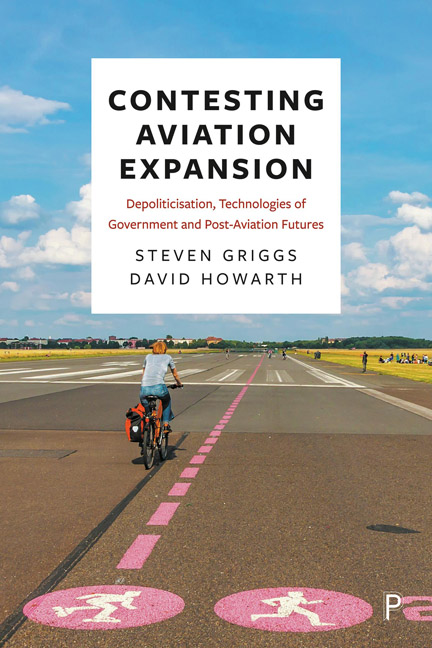 Contesting Aviation Expansion
Contesting Aviation Expansion Book contents
- Frontmatter
- Contents
- List of figures and tables
- List of abbreviations
- Acknowledgements
- Introduction: Problematising the dilemmas of UK airport expansion – puzzles and research strategies
- 1 Depoliticisation, discourse and policy hegemony
- 2 Governing by numbers: fantasies of forecasting, ‘predict and provide’ and the technologies of government
- 3 The anatomy of an expert Commission: Howard Davies, rhetorical reframing and the performance of leadership
- 4 Repoliticising aviation policy: law, planning and persistent activism
- 5 Extreme turbulence: problematisations, multiple crises and new demands
- 6 ‘What if…?’ A manifesto for the green transformation of aviation
- Conclusion: Staying grounded
- Notes
- References
- Index
1 - Depoliticisation, discourse and policy hegemony
Published online by Cambridge University Press: 18 January 2024
- Frontmatter
- Contents
- List of figures and tables
- List of abbreviations
- Acknowledgements
- Introduction: Problematising the dilemmas of UK airport expansion – puzzles and research strategies
- 1 Depoliticisation, discourse and policy hegemony
- 2 Governing by numbers: fantasies of forecasting, ‘predict and provide’ and the technologies of government
- 3 The anatomy of an expert Commission: Howard Davies, rhetorical reframing and the performance of leadership
- 4 Repoliticising aviation policy: law, planning and persistent activism
- 5 Extreme turbulence: problematisations, multiple crises and new demands
- 6 ‘What if…?’ A manifesto for the green transformation of aviation
- Conclusion: Staying grounded
- Notes
- References
- Index
Summary
The Airports Commission has been described as a once in a lifetime opportunity to secure the UK's aviation capacity for the future, but delivery of the long term solution it ultimately recommends needs cross-party political agreement. Our panellists describe the process of ‘depoliticising’ the eventual scheme, so that it doesn't get derailed by short term political considerations, and how it can be delivered, effectively, in as short a time as possible, within the UK's democratic processes.
(Runways UK, 2014a)On 16 January 2014, as its founding event, Runways UK convened a major conference on airport expansion in the UK. The event was entitled ‘Airport Infrastructure for a Future Britain’, and it was hosted and moderated by the broadcaster Kirsty Wark. Describing itself as a ‘neutral platform for scheme debate’ (Runways UK, 2014b), the new network was one of a plethora of groups and initiatives that has sought to influence the development of UK aviation policy in recent times. One of its afternoon panels – ‘Achieving Cross-party Agreement and Delivery’ – discussed the ‘delivery of the longterm solution’ required to satisfy the UK's aviation capacity needs. The panellists included Lord Adonis, the former Labour Government Secretary of State for Transport, and Nelson Ogunshakin, the Co-Chair of National Infrastructure Plan Strategic Engagement Forum, which was set up under the Coalition Government. It was not insignificant that the event was chaired by Baroness Valentine, who was then the chief executive of London First, the pro-Heathrow expansion business group campaigning to get the proposed third runway back on the political agenda. In order to frame the discussion, the introductory preamble in the Conference programme explicitly asked its panellists to describe the process of ‘depoliticising’ the ‘eventual scheme’ that would be proposed by the AC. The latter was chaired by Sir Howard Davies, and finally reported on 1 July 2015, following the May general election (Runways UK, 2014a: 7).
- Type
- Chapter
- Information
- Contesting Aviation ExpansionDepoliticisation, Technologies of Government and Post-Aviation Futures, pp. 21 - 42Publisher: Bristol University PressPrint publication year: 2023
